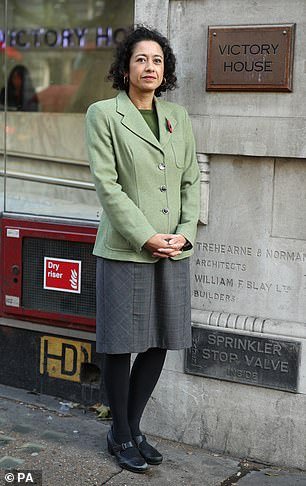BBC presenter Samira Ahmed says she is ‘haunted’ by fear that corporation’s coverage boosted Nigel Farage and Ukip
- Ms Ahmed’s comments prompted a discussion with her bosses at the BBC who have previously warned staff over making partial comments on politics
- She had been interviewing Ian Hislop for her own non-BBC podcast
- Ms Ahmed said she was ‘haunted’ by complaints over BBC’s coverage of Farage
- Said separately that Tory housing minister Robert Jenrick should have resigned
BBC presenter Samira Ahmed has said she is ‘haunted’ by a fear that the corporation’s coverage boosted Nigel Farage and Ukip.
The 55-year-old also said that ministers ‘won’t resign over obvious issues that you might have expected them to,’ referring to Robert Jenrick’s approval of a £1 billion housing development backed by Tory donor Richard Desmond.
Ms Ahmed’s comments, made during a recording on her non-BBC podcast ‘How I Found My Voice’, prompted a discussion with her bosses at Broadcasting House who have previously warned staff over giving partial political views.
She was interviewing Ian Hislop when she asked whether he believed hosting guests including Boris Johnson and Jacob Rees-Mogg on Have I Got News For You might have boosted their profiles.
Uninvited by Mr Hislop, Ms Ahmed went on to say that she remembered complaints about the BBC’s coverage ‘building up’ Mr Farage and his anti-EU party in the early 2010s.

Samira Ahmed said that she remembered complaints about the BBC’s coverage ‘building up’ Nigel Farage and his Ukip party in the early 2010s
‘I’m haunted by that and I remember talking to editors about it,’ she told Mr Hislop.
The Private Eye editor did not share the view that panel shows should only invite people ‘who are considered absolutely acceptable.’
He told Ms Ahmed: ‘That’s untenable and slightly dangerous. And also, there is a problem – and this is the same problem as giving people the vote I’m afraid – that if you allow people airtime, which they probably are allowed, people might like them.’
Ukip’s strong performance in European elections throughout the previous decade had secured its spot in the BBC’s coverage.
Mr Farage appeared on Question Time on 12 occasions from 2010 to the 2015 general election when he was leader of Ukip.
The party gained around three million votes compared to the previous election and won its first seat in parliament.
A year later Britain voted to leave the European Union and its vote share at latter elections has dropped off considerably. Mr Farage stepped down as leader in 2016.
Mr Hislop commented that during this period the standard of the government’s cabinet was ‘about as low as anything I’ve ever seen.’
To this, Ms Ahmed replied: ‘And [they] won’t resign over obvious issues that you might have expected them to. So, Robert Jenrick over the Richard Desmond property donation etc.’
Mr Jenrick approved a plan for 1,500 homes proposed by Mr Desmond which allowed the developer to avoid paying up to £50 million in council tax.
Tower Hamlets council took legal action against Mr Jenrick and he later recused himself from any future involvement and accepted his approval of planning permission had been ‘unlawful by reason of apparent bias.’
The BBC said in a statement: ‘All BBC news and current affairs journalists must avoid appearing to express personal views. We have discussed the video [of the event] with Samira and she is clear that she was referring to being “haunted” by the number of complaints rather than trying to give a wider commentary.’
Last year the public broadcaster warned its staff using social media not to ‘express a personal opinion on matters of public policy, politics, or “controversial subjects,”‘ and to ‘maintain your impartiality.’
